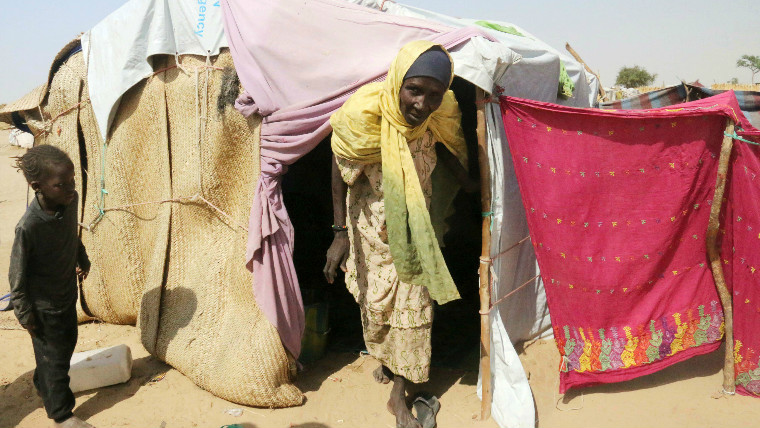9.2 million people require urgent humanitarian support as West African conflict intensifies
World Vision is urging the international community to respond to the worsening humanitarian crisis caused by fighting in the Lake Chad Basin of West Africa, as latest figures show that over 21 million people are facing food shortages.

Fade Gaptlaram, aged 60, fled her home in Nigeria after a rebel attack.
Intensified fighting by militant groups in the Lake Chad Basin - a region straddling across Nigeria, Niger, Chad and Cameroon - has forced many to flee their homes and livelihoods, leaving 9.2 million people in urgent need of humanitarian support.
Zena John, World Vision UK’s Regional Portfolio Manager for West Africa, says mounting concerns of child sex abuse, malnutrition, malaria, access to food, clean drinking water and adequate sanitation facilities have been reported in camps where refugees and internally displaced people fleeing the fighting are settled.
She said: “This crisis is severely underreported in the media and the relentless suffering continues.
“Every waking moment, millions of civilians fear brutal attacks and face the threat of hunger, disease outbreaks, epidemics and a sense of hopelessness. As the situation here continues to worsen, we are calling on the international community to respond urgently to provide the required funds and aid.
“Delayed action will only increase the financial and human costs; and result in a generation of children impacted by trauma of war and, in some regions, stunted growth due to lack of adequate food.”
According to World Vision officials, 1.4 million children are amongst those who have been displaced and nearly 1.2 million children require nutrition assistance. In Nigeria, 75,000 children risk dying in “a few months” as hunger grips the country’s ravaged north-east in the wake of the Islamist insurgency, the United Nations warned this month. Thousands of children remain out of school and hundreds must fend for themselves as they have been separated from loved ones.
Many displaced people are now living in conditions favourable for spreading communicable diseases such as cholera, measles, meningitis and yellow fever. Additional concerns include conflict-related trauma, injuries and disabilities, and an increased need for mental health services.
Dr Kathryn Taetzsch, World Vision’s Response Director for the Lake Chad Basin Crisis, said: “World Vision has scaled up efforts to support 300,000 of the most vulnerable hosts, internally displaced people and refugees in the affected regions of Chad and Niger, but the needs here exceed our capacity.”
World Vision is working in Niger’s region of Diffa where the UN reports that three in four people are in urgent need of humanitarian assistance. Over 9 million people – more than the city of London - across the Lake Chad Basin region are in desperate need of aid.
Dr Taetzsch added: “Decades of humanitarian and development gains are threatening to unravel if the global community is unable to sufficiently respond to the crisis in the Lake Chad Basin. We need Governments to provide more flexible funding for the UN and NGO’s to allow for humanitarian response to cover the needs of host communities, as well as the displaced.
“That is why we are calling on the UN to take immediate action to declare the Lake Chad Basin in Level 3 emergency, and prioritise funding, humanitarian aid and recourses to the region,” she said.
For more information, pictures, case studies and interviews, please contact:
Parveen Devi | Media Officer | World Vision UK | www.worldvision.org.uk Mobile +44 (0)7535650174| E-mail: parveen.devi@worldvision.org.uk | Skype: ParveenDevi |